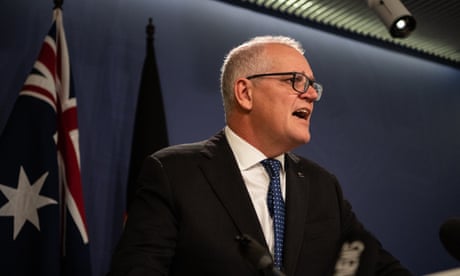- by foxnews
- 23 May 2025
Scott Morrison had a penchant for secrecy and centralising power - here are four examples
Scott Morrison had a penchant for secrecy and centralising power - here are four examples
- by theguardian
- 19 Aug 2022
- in news

This week we learned Scott Morrison was appointed to five extra ministries without his colleagues' knowledge - but there were signs earlier in his prime ministership that he wanted to keep information secret and centralise power.
Morrison in 2019 arranged it so that he could hold meetings with anyone and treat them as cabinet-in-confidence. During the pandemic, the National Covid-19 Coordination Commission was set up essentially as a shadow public service.
Later, his government blocked freedom of information claims even after a tribunal ruled the so-called national cabinet was not a "cabinet" at all.
We've traced the warning signs that preceded this week's extraordinary revelations.
In 2019, Morrison was on the hunt for new policies and ordered his ministers to conduct policy "deep dives" to find them through consultations with stakeholders, including business.
In Senate estimates, Labor discovered this was achieved through the establishment of the cabinet office policy committee, a body with just one permanent member: Scott Morrison.
When meeting with ministers, public servants and stakeholders - not all of whom were cabinet members - Morrison could nevertheless claim the meetings were cabinet-in-confidence. Even if nothing discussed made it out of the "deep dive" and into the real cabinet.
Penny Wong labelled this an "abuse of process" used to "cover up blatant political decision-making", which then finance minister Mathias Cormann rejected.
It was this body that Anthony Albanese was referring to on Tuesday when he said he "cannot conceive" how the committee of one was possible - and how Morrison's colleagues had "sat back and watched power be centralised".
Fast forward to the pandemic. In March 2020, Morrison got himself appointed to administer the departments of health and finance, the first of five portfolios he would collect.
Greg Hunt knew about the first appointment, as did the then attorney general, Christian Porter, who advised how it could be done.
Once he'd learned the trick, Morrison added industry, science energy and resources, home affairs, and treasury - none with the extant minister's knowledge, and none disclosed publicly, except to the authors of the book Plagued in "contemporaneous" interviews.
In addition to his shadow government, Morrison in March 2020 set up a shadow public service: the National Covid-19 Coordination Commission, which sparked similar warnings of lack of transparency and executive overreach.
The body had no legislative underpinning and the government did not use an independent appointment process to select its members. The commission allowed the government to choose its own advisers from outside the public service, which is supposed to give frank and fearless advice.
And what was the biggest recommendation of the body led by Nev Power, deputy chairman of a gas company? The gas-led recovery.
Morrison also replaced the Council of Australian Governments with the national cabinet, a body that, like his committee of one, was defined as a subcommittee of the commonwealth cabinet.
Then senator Rex Patrick challenged that legal fiction and won in the administrative appeals tribunal.
The national cabinet lacked features of a cabinet subcommittee: its members were not federal ministers, they were state and territory leaders, and they were chosen not by the prime minister but by voters.
The Morrison government agreed to provide Patrick with his documents but said that AAT judgments did not apply across the board, continuing to block other FOI requests.
The Albanese government has sought to restore normal processes.
Although the prime minister has maintained the secrecy of national cabinet, the attorney general, Mark Dreyfus, has explained this will be done through other FOI exemptions (such as potential harm to inter-governmental relations), not a legal fiction about what national cabinet is.
The committee of one is also gone, apparently done away with in administrative orders in late June.
There can be legitimate reasons for secrecy and for emergency powers. But two key characteristics of the Morrison government were secrecy at all costs and innovative or legally dubious means to achieve it.
- by foxnews
- descember 09, 2016
United Airlines flight returns to Hawaii after concerning message found on bathroom mirror; FBI investigating
United Airlines Flight 1169 to Los Angeles returned to Hawaii after a "potential security concern" aboard the plane. The FBI and police are investigating.
read more


